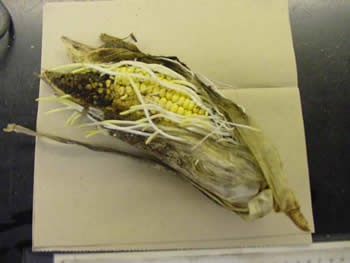 Source: P.Thomison, OSU |
 Source: P.Thomison, OSU |
Symptoms:
Germination of mature corn kernels (“Vivipary”) on the cob prior to harvest.
Cause:
Premature sprouting is most likely to occur when reasonably dry kernels ( less than about 20 percent grain moisture content) are re-wetted, especially when temperatures are warm. A combination of factors, including erect ears, bird damage, ear molds, wet weather and flooding, contribute to premature sprouting. When corn in the dent stage is immersed by flood waters for six hours or more, it usually results in extensive premature kernel sprouting and major grain quality deterioration. Rainfall collected by husk leaves on upright ears often leads to kernel sprouting near the butt of the ear. Premature sprouting also occurs when ears are lying on or near the soil surface due to severe stalk breakage or lodging. In such situations, the proximity of ears to moist soil allows a similar re-wetting of the kernels and extensive germination of kernels on the cob.
Management:
Sprouted kernels are usually lighter. In severe cases, this “lightness” can reduce grain yield and test weight. Sprouted kernels are also more likely to develop molds and mycotoxins. These developments could result in discounting if the problem is extensive. Often, during the harvesting and drying processes, sprouts will disappear and grain will appear normal. Fields showing widespread kernel sprouting should be prioritized for early harvest.
References:
Anonymous. 2002. Sprout damage. USDA FGIS/Education and Outreach Visual Reference Library – Corn. Available at http://www.gipsa.usda.gov/vri/corn_9.aspx [URL verified 1/16/2019].
Nielsen, R. 2012. Premature Corn Kernel Sprouting (aka Vivipary). Corny News Network, Purdue Extension. Available at http://www.agry.purdue.edu/ext/corn/news/timeless/Vivipary.html [URL verified 3/28/2019].

